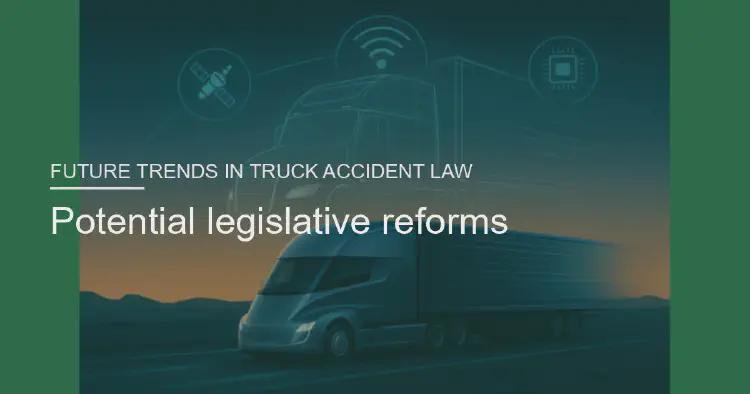Potential legislative reforms
Lawmakers continue to explore new legislation addressing safety, technology, and accountability in the trucking industry. These reforms could significantly reshape liability and regulation in truck accident cases.
- Truck Accident Law Team
- 2 min read
Article 6 of 6 in Future Trends in Truck Accident Law/

Potential Legislative Reforms in Truck Accident Law
1. Increased Insurance Minimums
- Current federal minimum of $750,000 for liability coverage has not been updated in decades.
- Proposals suggest raising limits to reflect modern medical costs, potentially exceeding $2–5 million.
2. Autonomous Truck Regulation
- New laws may establish liability frameworks for self-driving trucks.
- Could include mandatory human oversight requirements or manufacturer liability standards.
- Likely to expand federal safety testing protocols.
3. Safety Technology Mandates
- Congress may require trucks to include automatic emergency braking, collision avoidance, lane departure warnings, and electronic stability control.
- Similar to seat belt and airbag mandates in the past.
4. Hours of Service and Fatigue Reform
- Calls for stricter rest requirements and enhanced enforcement.
- Legislative efforts may expand real-time monitoring systems for compliance.
5. Environmental and Climate Regulations
- Laws may target emissions reduction, electrification of fleets, and stricter idling restrictions.
- Incentives for adopting green trucking technology could become more common.
6. Cybersecurity Standards
- Anticipated reforms to protect against hacking of connected or autonomous trucks.
- Could include mandatory reporting of cybersecurity breaches in commercial fleets.
7. Victim Compensation Systems
- Some proposals advocate for national victim compensation funds to streamline payouts in catastrophic accidents.
- Would provide quicker relief without requiring lengthy litigation.
Legal Impact
- New reforms would expand liability exposure for manufacturers, trucking companies, and insurers.
- Plaintiffs’ attorneys must adapt strategies to incorporate evolving regulations.
- Defense attorneys will face expanded compliance obligations.
Summary: Potential legislative reforms in truck accident law include higher insurance minimums, autonomous truck liability rules, mandated safety technologies, stricter fatigue enforcement, environmental standards, cybersecurity safeguards, and victim compensation systems. These reforms aim to enhance safety, accountability, and fairness in the trucking industry.
You might also like:
- Tags:
- Trucking Companies
- Hours Service
- Medical Costs
- Accident Law
- Plaintiffs Attorneys
- Defense Attorneys
- Trucking Industry
- Liability Coverage
- Autonomous Trucks
- Insurance Minimums
- Safety Technology
- Companies Insurers
- Liability Exposure
- Manufacturer Liability
- Collision Avoidance
- Minimum Liability
- Legislative Reforms
- Establish Liability
- Safety Technologies
- Departure Warnings
- Lane Departure
- Autonomous Truck
- Increased Insurance
- Truck Accident Law
- Minimum Liability Coverage
- Trucking Companies Insurers
- Lane Departure Warnings
- Automatic Emergency Braking
- Manufacturers Trucking Companies
- Avoidance Lane Departure
- Collision Avoidance Lane
- Electronic Stability Control
- Modern Medical Costs
- Higher Insurance Minimums
- Federal Minimum Liability
- Increased Insurance Minimums
- Safety Technology Mandates